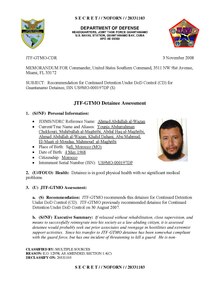| Yunis Abdurrahman Shokuri | |
|---|---|
 Ahmad Abdullah al-Wazan's Guantanamo detainee assessment Ahmad Abdullah al-Wazan's Guantanamo detainee assessment | |
| Born | (1968-05-04) May 4, 1968 (age 56) Safi, Morocco |
| Released | February 2016 Morocco |
| Citizenship | Moroccan |
| Detained at | Guantanamo, Moroccan prisons |
| Other name(s) | Ahmad Abdullah al Wazan
|
| ISN | 197 |
| Status | Was held in extrajudicial detention in Guantanamo for over thirteen years |
Yunis Abdurrahman Shokuri (Arabic: يونس عبد الرحمن الشقوري) is a citizen of Morocco who was held in extrajudicial detention in the Guantanamo Bay detention camps, in Cuba. The Department of Defense reports his date of birth as May 4, 1968. The Department of Defense reports that he was born in Safi, Morocco.
Shokuri was repatriated to Morocco, in spite of its human rights record, when US State Department officials asserted they had diplomatic assurances that he would not be incarcerated in Morocco, after his return. In fact he was held, without charge, for a further six months. The New York Times reports that, after he was finally free, he denounced the Islamic State and other radical fundamentalist Muslim militants.
Press reports
On July 12, 2006, the magazine Mother Jones provided excerpts from the transcripts of a selection of the Guantanamo detainees.
Shokuri was one of the detainees profiled. According to the article his transcript contained the following comment:
- he only way I know the United States is through movies from Hollywood or through cartoons. I'm a big fan of a lot of their singers…. he first time I saw an American soldier was at Kandahar Air Base…. When I first saw myself in Kandahar, it was like I was in a cinema or a movie. I saw a 1996 movie called The Siege. The movie was about terrorists carrying out terrorist attacks in the United States…. the CIA and FBI were not successful in finding that terrorist group and the United States Army interfered and gathered all the people of Arabic descent and put them in a land cage or camp just like it happened in Kandahar. I was shocked, thinking, "Am I in that movie or on a stage in Hollywood?"… Sometimes I laugh at myself and say, "When does that movie end?"
Inconsistent identification
Shokuri was named inconsistently in official Department of Defense documents.
- He was named Yunis Abdurrahman Shokuri in the official list of all captives, released on May 15, 2006.
- He was named Yuunis Shokuri in one of the allegations in the Summary of Evidence memo prepared for Laacin Ikrassin, another Moroccan, which justified his continued detention because he associated with Radwan Shokuri and Yuunis Shokuri.:
- He was named Ahmed Abdullah Al-Wazan on a list published on August 15, 2006.
- He was named Younous Chekkouri on his habeas corpus petition.
Habeas corpus petition
| This section needs expansion. You can help by adding to it. (August 2011) |
Shokuri had a writ of habeas corpus filed on his behalf.
On July 15, 2008, Jan K. Kitchel filed a "PETITIONER'S REQUEST FOR 30-DAY NOTICE OF REMOVAL OR TRANSFER" on Shokuri's behalf in Civil Action No. CV 05-0329 (HHK).
The petition would prevent the Department of Defense from transferring him out of US jurisdiction without giving his attorney's thirty days notice. The Department of Defense had transferred some captives to countries where they were subsequently subjected to abusive treatment—even though they had active habeas corpus petitions.
References
- "JTF- GTMO Detainee Assessment" (PDF). Department of Defense. Retrieved June 21, 2023.
- ^ "List of Individuals Detained by the Department of Defense at Guantanamo Bay, Cuba from January 2002 through May 15, 2006" (PDF). United States Department of Defense. Archived from the original (PDF) on September 30, 2007. Retrieved May 15, 2006.
- ^ "Moroccan Freed From Guantanamo Slams IS, Reflects on Torture". New York Times. February 16, 2016. Archived from the original on February 19, 2016. Retrieved February 16, 2016.
Still, Younis remained at the U.S. base in Cuba until September last year, caught up in international legal wrangling, and upon his arrival in Morocco he was immediately detained without any charges or detailed explanation of why.
-
Dave Gilson (July 12, 2006). "Why Am I in Cuba?". Mother Jones. Archived from the original on July 19, 2006. Retrieved February 17, 2016.
Detainees could respond directly to the accusations made against them and were assigned to an officer who shepherded them through the process. However, they did not have access to lawyers and often could not fully examine the government's claims, particularly if those claims were based on classified information.
- "Summary of Evidence for Combatant Status Review Tribunal -- Ikrassin Laacin" (PDF). United States Department of Defense. 2004. p. 88. Archived from the original (PDF) on December 2, 2007. Retrieved October 3, 2007.
- "Respondents' response to Court's August 7, 2006 order" (PDF). United States Department of Defense. August 15, 2006. Archived from the original (PDF) on September 2, 2008. Retrieved June 23, 2008.
- ^ Jan K. Kitchel (July 15, 2008). "Guantanamo Bay Detainee Litigation: Doc 64 -- PETITIONER'S REQUEST FOR 30-DAY NOTICE OF REMOVAL OR TRANSFER" (PDF). United States Department of Justice. Archived (PDF) from the original on March 9, 2012. Retrieved November 12, 2008.
External links
- Who Are the Remaining Prisoners in Guantánamo? Part Three: Captured Crossing from Afghanistan into Pakistan (1 of 2) Andy Worthington, September 22, 2010
- Yunis Abdurrahman Shokuri - biography
| Controversies surrounding people captured during the War on Terror | |
|---|---|
| Guantanamo Bay detention camp | |
| CIA black site operations | |
| Prison and detainee abuse | |
| Prison uprisings and escapes | |
| Deaths in custody | |
| Tortured | |
| Forced disappearances | |
| Reports and legal developments | |
| Related media | |